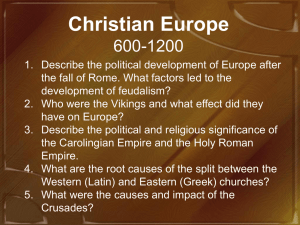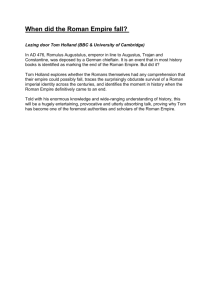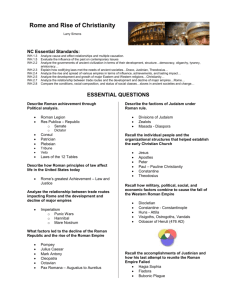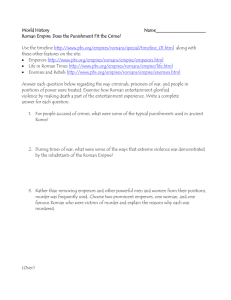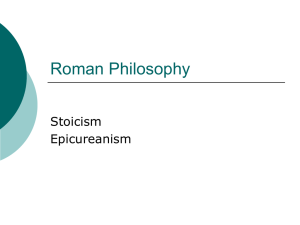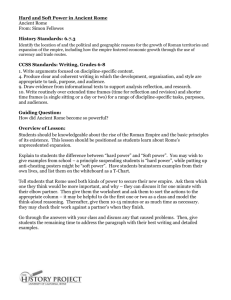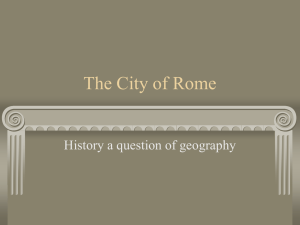Socratic Seminar: The Rise and Fall of Rome
advertisement
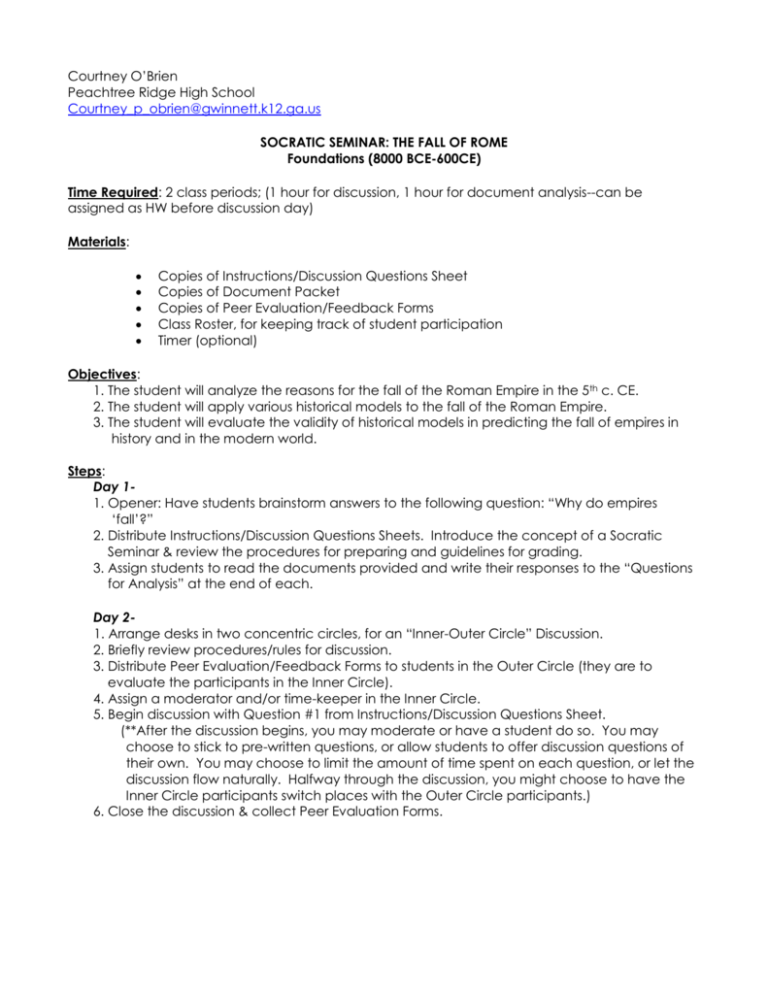
Courtney O’Brien Peachtree Ridge High School Courtney_p_obrien@gwinnett.k12.ga.us SOCRATIC SEMINAR: THE FALL OF ROME Foundations (8000 BCE-600CE) Time Required: 2 class periods; (1 hour for discussion, 1 hour for document analysis--can be assigned as HW before discussion day) Materials: Copies of Instructions/Discussion Questions Sheet Copies of Document Packet Copies of Peer Evaluation/Feedback Forms Class Roster, for keeping track of student participation Timer (optional) Objectives: 1. The student will analyze the reasons for the fall of the Roman Empire in the 5 th c. CE. 2. The student will apply various historical models to the fall of the Roman Empire. 3. The student will evaluate the validity of historical models in predicting the fall of empires in history and in the modern world. Steps: Day 11. Opener: Have students brainstorm answers to the following question: “Why do empires ‘fall’?” 2. Distribute Instructions/Discussion Questions Sheets. Introduce the concept of a Socratic Seminar & review the procedures for preparing and guidelines for grading. 3. Assign students to read the documents provided and write their responses to the “Questions for Analysis” at the end of each. Day 21. Arrange desks in two concentric circles, for an “Inner-Outer Circle” Discussion. 2. Briefly review procedures/rules for discussion. 3. Distribute Peer Evaluation/Feedback Forms to students in the Outer Circle (they are to evaluate the participants in the Inner Circle). 4. Assign a moderator and/or time-keeper in the Inner Circle. 5. Begin discussion with Question #1 from Instructions/Discussion Questions Sheet. (**After the discussion begins, you may moderate or have a student do so. You may choose to stick to pre-written questions, or allow students to offer discussion questions of their own. You may choose to limit the amount of time spent on each question, or let the discussion flow naturally. Halfway through the discussion, you might choose to have the Inner Circle participants switch places with the Outer Circle participants.) 6. Close the discussion & collect Peer Evaluation Forms. Socratic Seminar: The Fall of Rome The topic: For this Socratic seminar, you will be reading about and discussing some of the reasons for the rise and fall of empires. Using the information gained from reading the excerpts provided, as well as any prior knowledge, you will explore some of the causes for the fall of the Roman Empire. Then, you will apply your knowledge of the rise and fall of Rome to the rise and fall of other “empires” throughout history. In addition to the four documents, read pages 97-100 in your textbook describing the decline and fall of Rome. The questions: After reading the documents provided, consider the following questions--as these will be the catalyst for our in-class discussion. 1. Why did Rome fall? Who Should Be to Blame? 2. Do empires really have “seasons”? 3. Is the United States destined to “fall” as the Roman Empire did? Why or why not? The text: Attached you will find 4 documents (3 secondary sources and 1 primary source) containing information and theories on the reasons for the fall of the Roman Empire. You will be given time to read the documents independently. You may make notes and/or highlight in the documents (as you will be expected to reference them during the discussion). At the end of each document are analysis questions for you to answer as you prepare for the discussion. The discussion: In a Socratic seminar, the participants determine the quality of discussion through making insightful comments and asking questions. The discussion will only be as interesting as you make it! The following is a list of expectations for the discussion: 1. 2. 3. 4. Refer to the text when asking questions and making comments. Discuss your ideas with each other, not just with me. Listen respectfully and take turns speaking. Stick to the point being discussed. The grading: You will be graded on THREE major criteria: 1) participation in the discussion, 2) references made to the text, and 3) written responses to post-seminar reflection. Document #1: PASSAGES FROM GIBBON'S DECLINE AND FALL OF THE ROMAN EMPIRE Chapter 2: ”Rome, the capital of a great monarchy, was incessantly filled with subjects and strangers from every part of the world, who all introduced and enjoyed the favourite superstitions of their native country.” “The natives of Italy, allured by pleasure or by interest, hastened to enjoy the advantages of victory.” “This obvious difference marked the two portions of the empire with a distinction of colours, which, though it was in some degree concealed during the meridian splendour of prosperity, became gradually more visible as the shades of night descended upon the Roman world.” “Among the innumerable monuments of architecture constructed by the Romans, how many have escaped the notice of history, how few have resisted the ravages of time and barbarism!” Chapter 5: “[T]he Romans, after the fall of the republic, combated only for the choice of masters. Under the standard of a popular candidate for empire, a few enlisted from affection, some from fear, many from interest, none from principle.” Chapter 9: “The sounds that summoned the German to arms... aroused him from his uncomfortable lethargy, gave him an active pursuit, and, by strong exercise of the body, and violent emotions of the mind, restored him to a more lively sense of his existence. In the dull intervals of peace, these barbarians were immoderately addicted to deep gaming and excessive drinking; both of which, by different means, the one by inflaming their passions, the other by extinguishing their reason, alike relieved them from the pain of thinking.” Chapter 10: “[T]o the south of that inland sea were situated the soft and wealthy provinces of Asia Minor, which possessed all that could attract, and nothing which could resist, a barbarian conqueror.” Chapter 12: ”The infrequency of marriage, and the ruin of agriculture, affected the principles of population, and not only destroyed the strength of the present, but intercepted the hope of future generations.” “[I]n the prosecution of a favourite scheme, the best of men, satisfied with the rectitude of their intentions, are subject to forget the bounds of moderation.” Chapter 15: ”The innumerable deities and rites of polytheism were closely interwoven with every circumstance of business or pleasure, of public or of private life; and it seemed impossible to escape the observance of them, without, at the same time, renouncing the commerce of mankind, and all the offices and amusements of society.” “The progress of the ecclesiastical authority gave birth to the memorable distinction of the laity and of the clergy, which had been unknown to the Greeks and Romans.... a celebrated order of men which has furnished the most important, though not always the most edifying, subjects for modern history.” Chapter 16: “After taking such effectual measures to abolish the worship and to dissolve the government of the Christians, it was thought necessary to subject to the most intolerable hardships the condition of those perverse individuals who should reject the religion of nature, or Rome, and of their ancestors.” Chapter 17: ”The manly pride of the Romans, content with substantial power, had left to the vanity of the East the forms and ceremonies of ostentatious greatness.” Chapter 31: ”The greater part of the nobles, who dissipated their fortunes in profuse luxury, found themselves poor in the midst of wealth, and idle in a constant round of dissipation.” Chapter 32: ”The division of the Roman world between the sons of Theodosius [ie., Honorius and Arcadius] marks the final establishment of the empire of the East, which, from the reign of Arcadius to the taking of Constantinople by the Turks, subsisted one thousand and fifty-eight years in a state of perpetual decay.” ________________________________________________________________________________________________ Questions for Analysis: 1. List five things Gibbon alludes to as causes for the fall of the Roman Empire AND explain each with historical context: a. b. c. d. e. 2. Of the issues listed above, in your opinion, which was the most detrimental to the preservation of the Roman Empire? Why? 3. Do some brief research on Gibbon and his book. Do you believe him to be a reliable source? Do you buy in to his argument(s)? Document #2: BASED ON OSWALD SPENGLER’S THE DECLINE OF THE WEST German historian Oswald Spengler argues civilizations, similar to individuals, go through a life-cycle with distinct stages. Spengler applies these stages to his study of the great ancient and classical civilizations (Egypt, India, Rome, etc). Spengler argues, like human beings, civilizations also must one day die. Listed below are the four basic stages of the cultural “life” and “death” of a civilization, according to Spengler. The stages are equated to the four seasons of the year: Stage I “Springtime” Stage II “Summertime” Stage III “Autumn” Stage IV “Winter” Culture shows great willpower, or “Soul”. In this period, people of a culture produce art and political forms to express their view of the world. The knight/warrior, and the men of noble blood are the rulers. The first stirrings of revolt against springtime form. Preexisting attitudes towards rulers, power, and religion are challenged. This stage marks beginning of an urbanbased culture. The merchant becomes a powerful member of society. In this stage the culture becomes a powerful civilization ruled by city-dwellers. Government becomes more complex. Religion is overshadowed by belief in the human mind and scientific reasoning. The culture enters a state of self-doubt. It looks for a new philosophy of life. Former connections with the land (peasantry) are almost completely lost. The masses of the city are the ruling force. The culture has lost some of its identity, will, and “Soul”. Spengler estimated the life spans of the following civilizations, based on his theory & study of history: Egyptian Culture Begins 3000 BC – Declines 1500 BC Indian Culture Begins 1550 BC – Declines 400 BC Classical Culture Begins 1100 BC – Declines 27 BC (rise of Augustus & beginning of Roman Empire) Roman Culture Begins 509 BC – Declines 476 AD Arabian Culture Begins 0 – Declines 1000 AD ________________________________________________________________________________________________ Questions for Analysis: 1.Do you generally agree with the breakdown of the stages provided by Spengler’s ideas? Why or why not? 2. If you had to argue what “season” the United States is currently in, what would your argument be? Explain. Document #3: Conrad Demarest’s Model for the Rise and Fall of Empires 1. Necessary preconditions for the rise of empires-the region must have: a) State-level government b) High agricultural potential of the environment c) An environmental mosaic d) Several small states with no clear dominant state (power vacuum) e) Mutual antagonism among those states f) Adequate military resources (or a military or technological advantage) 2. States succeed in empire building if they have an ideology that promotes personal identification with the state, empire, leader, conquest, and/or militarism. 3. Characteristics of well-run empires a) Build roads and transportation systems, canals, ports, etc. b) Trade increases c) Cosmopolitan cities-art and education flourish d) Effective bureaucracy to ensure communication, collect taxes, oversee coinage, ensure the laws are enforced e) Common official language (communication) f) System of justice, law for entire empire g) Citizenship or rights extend in some degree to conquered; must be some "buy-in" 4. Major results of empire: a) Economic rewards, especially in the early years, redistributed to elite and trickles down to other classes (esp. merchants, scribes, etc.) b) Relative stability and prosperity c) Population increase 5. Empires fall because: a) Failure of leadership; focus on wealth, etc. not the needs of the state b) Ideology of expansion and conquest leads to attempting new conquests beyond a practical limit: overstretching of bureaucracy, military, resources, communications c) Lack of new conquests erodes economic base and lessens faith in ideology of the empire d) Rebellions from within/ challenges from without ________________________________________________________________________________________________ Questions for Analysis: 1. Apply the five stages of Demarest’s model to the Roman Republic/Empire. Does it fit the model? Explain why or why not. 2. Do you agree with Demarest’s characteristics of what makes a “well-run” empire? Are there any criteria you would add/remove from this list? 3. Based on the information above, should the United States be considered an “empire”? Why or why not? Document #4: Ammianus Marcellinus (c.330-395 CE): History, XIV.16: “The Luxury of the Rich in Rome”, c. 395 CE. “Rome is still looked upon as the queen of the earth, and the name of the Roman people is respected and venerated. But the magnificence of Rome is defaced by the inconsiderate levity of a few, who never recollect where they are born, but fall away into error and licentiousness as if a perfect immunity were granted to vice. Of these men, some, thinking that they can be handed down to immortality by means of statues, are eager after them, as if they would obtain a higher reward from brazen figures unendowed with sense than from a consciousness of upright and honorable actions; and they are even anxious to have them plated over with gold! Others place the summit of glory in having a couch higher than usual, or splendid apparel; and so toil and sweat under a vast burden of cloaks which are fastened to their necks by many clasps, and blow about by the excessive fineness of the material, showing a desire by the continual wriggling of their bodies, and especially by the waving of the left hand, to make more conspicuous their long fringes and tunics, which are embroidered in multiform figures of animals with threads of divers colors. Others again, put on a feigned severity of countenance, and extol their patrimonial estates in a boundless degree, exaggerating the yearly produce of their fruitful fields, which they boast of possessing in numbers, from east and west, being forsooth ignorant that their ancestors, who won greatness for Rome, were not eminent in riches; but through many a direful war overpowered their foes by valor, though little above the common privates in riches, or luxury, or costliness of garments. If now you, as an honorable stranger, should enter the house of any passing rich man, you will be hospitably received, as though you were very welcome; and after having had many questions put to you, and having been forced to tell a number of lies, you will wonder---since the gentleman has never seen you before---that a person of high rank should pay such attention to a humble individual like yourself, so that you become exceeding happy, and begin to repent not having come to Rome ten years before. When, however, relying on this affability you do the same thing the next day, you will stand waiting as one utterly unknown and unexpected, while he who yesterday urged you to "come again," counts upon his fingers who you can be, marveling for a long time whence you came, and what you can want. But when at last you are recognized and admitted to his acquaintance, if you should devote yourself to him for three years running, and after that cease with your visits for the same stretch of time, then at last begin them again, you will never be asked about your absence any more than if you had been dead, and you will waste your whole life trying to court the humors of this blockhead. But when those long and unwholesome banquets, which are indulged in at periodic intervals, begin to be prepared, or the distribution of the usual dole baskets takes place, then it is discussed with anxious care, whether, when those to whom a return is due are to be entertained, it is also proper to ask in a stranger; and if after the question has been duly sifted, it is determined that this may be done, the person preferred is one who hangs around all night before the houses of charioteers, or one who claims to be an expert with dice, or affects to possess some peculiar secrets. For hosts of this stamp avoid all learned and sober men as unprofitable and useless---with this addition, that the nomenclators also, who usually make a market of these invitations and such favors, selling them for bribes, often for a fee thrust into these dinners mean and obscure creatures indeed. The whirlpool of banquets, and divers other allurements of luxury I omit, lest I grow too prolix. Many people drive on their horses recklessly, as if they were post horses, with a legal right of way, straight down the boulevards of the city, and over the flint-paved streets, dragging behind them huge bodies of slaves, like bands of robbers. And many matrons, imitating these men, gallop over every quarter of the city, with their heads covered, and in closed carriages. And so the stewards of these city households make careful arrangement of the cortege; the stewards themselves being conspicuous by the wands in their right hands. First of all before the master's carriage march all his slaves concerned with spinning and working; next come the blackened crew employed in the kitchen; then the whole body of slaves promiscuously mixed with a gang of idle plebeians; and last of all, the multitude of eunuchs, beginning with the old men and ending with the boys, pale and unsightly from the deformity of their features. Those few mansions which were once celebrated for the serious cultivation of liberal studies, now are filled with ridiculous amusements of torpid indolence, reechoing with the sound of singing, and the tinkle of flutes and lyres. You find a singer instead of a philosopher; a teacher of silly arts is summoned in place of an orator, the libraries are shut up like tombs, organs played by waterpower are built, and lyres so big that they look like wagons! and flutes, and huge machines suitable for the theater. The Romans have even sunk so far, that not long ago, when a dearth was apprehended, and the foreigners were driven from the city, those who practiced liberal accomplishments were expelled instantly, yet the followers of actresses and all their ilk were suffered to stay; and three thousand dancing girls were not even questioned, but remained unmolested along with the members of their choruses, and a corresponding number of dancing masters. On account of the frequency of epidemics in Rome, rich men take absurd precautions to avoid contagion, but even when these rules are observed thus stringently, some persons, if they be invited to a wedding, though the vigor of their limbs be vastly diminished, yet when gold is pressed in their palm they will go with all activity as far as Spoletum! So much for the nobles. As for the lower and poorer classes some spend the whole night in the wine shops, some lie concealed in the shady arcades of the theaters. They play at dice so eagerly as to quarrel over them, snuffing up their nostrils, and making unseemly noises by drawing back their breath into their noses:---or (and this is their favorite amusement by far) from sunrise till evening, through sunshine or rain, they stay gaping and examining the charioteers and their horses; and their good and bad qualities. Wonderful indeed it is to see an innumerable multitude of people, with prodigious eagerness, intent upon the events of the chariot race!” Source: Adapted from: William Stearns Davis, ed., Readings in Ancient History: Illustrative Extracts from the Sources, 2 Vols. (Boston: Allyn and Bacon, 1912-13), Vol. II: Rome and the West, pp. 224225, 239-244, 247-258, 260-265, 305-309. ________________________________________________________________________________________________ Questions for Analysis: 1. In this primary source account, how does the author describe Roman values and attitudes in the late days of the empire? 2. Give some examples of social inequalities and/or causes for civil unrest shown in the passage: a. b. c.



